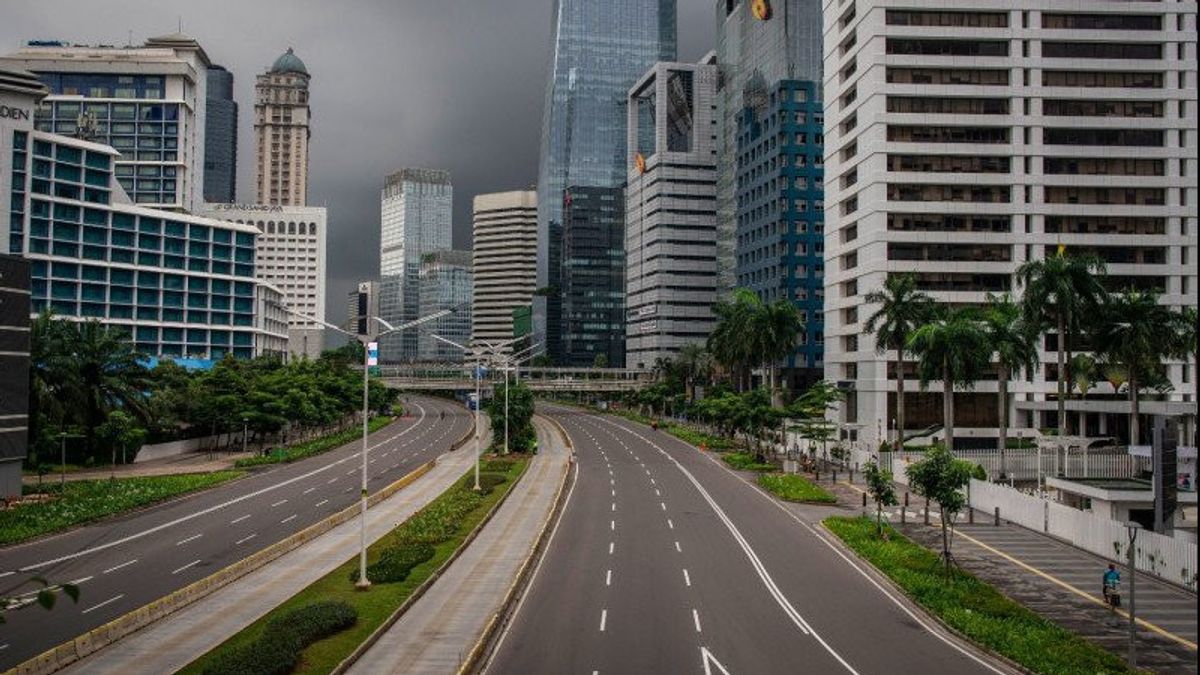JAKARTA - Indef economist Dzulfian Syafrian reminded the government to remain vigilant, because global problems can spread to Indonesia.
Although, the International Monetary Fund (IMF) says Indonesia is a bright spot in the midst of the world's economic horror.
Dzulfian said that when globally declines, the impact on Indonesia is usually not as bad as other countries.
Especially countries that are indeed integrated with international trade. "On the other hand, Indonesia, which still relies on the domestic economy, relatively benefits from this gloomy global condition, but it is not impossible that global problems can spread to Indonesia," he said, quoted on Thursday, October 20. The world economic problems in question include international trade, weakening exports and hampering imports, as well as from the financial sector, such as currency turmoil, capital markets and debt securities markets.
Dzulfian said the turmoil in this financial market would cause fluctuations. He said, volatility is also getting bigger which makes uncertainty even higher. "As a result, the economy will be hampered because economic actors (both producers and consumers) will delay their economic decisions (buying, borrowing, investing, and others). In the end, the national economy will slow down," explained Dzulfian.
Meanwhile, the Executive Director of the Segara Institute Piter Abdullah Redjalam assessed that Indonesia's economic achievements and appreciation from the IMF would increase the opportunity for foreign capital to enter Indonesia.
"The IMF testimony that the strong defense Indonesian economy can increase global trust and this is expected to help enter foreign capital into Indonesia and further strengthen the Indonesian economy," Piter said.
According to Piter, Indonesia's economic resilience relies on domestic consumption which is expected to continue to improve.
In addition, Indonesia also does not rely too much on exports.
This makes Indonesia relatively more able to survive global economic turmoil than other countries that rely on exports.
"Indonesia is different from countries that rely too much on exports. The Indonesian economy relies more on domestic consumption which is expected to improve as the pandemic subsides," he said.
Although Indonesia does not rely on exports, Piter explained that the Indonesian economy is also helped by the high price of commodities in the international market, especially commodities.
"Global recession will certainly hold back or even lower commodity prices but will not make commodity prices fall. It will still be quite high and benefit Indonesia, which relies on commodities," he said.
According to Piter, Indonesia's condition is still quite good and is believed to be able to survive the global recession. Even the Indonesian economy can still grow above 5 percent.
"Even if Indonesia is affected by the global recession, it is estimated that only makes our economic growth slow down, it cannot reach the target above 5 percent. That is a bad scenario. Our best scenario can still grow above 5 percent," he concluded.
Previously, the IMF corrected the outlook for global economic growth in 2023 to 2.7 percent from the previously predicted 2.9 percent last July.
Currently mentioned, there are 28 countries that are asking for help from the IMF.
Coordinating Minister for Economic Affairs Airlangga Hartarto said Indonesia should be wary of The Perfect Storm, but remain optimistic about the growing economy.
"Indonesia's economy was able to grow by 5 percent over the last three quarters, and in the third and fourth quarters we also hope that its growth can reach the target of 5.2 percent," he said.
According to Airlangga, Indonesia's resilience is also reflected in several indicators that remain positive, such as consumption and investment.
Manufacturing PMI also recorded 53.7 in September 2022, as well as banking credit which still grew 10 percent in June 2022.
"In terms of external resilience, the balance of transactions and trade recorded a surplus. January to August the trade balance was a surplus of 35 billion US dollars. Likewise, foreign exchange reserves and debt ratios were at a safe level," concluded Airlangga.
The English, Chinese, Japanese, Arabic, and French versions are automatically generated by the AI. So there may still be inaccuracies in translating, please always see Indonesian as our main language. (system supported by DigitalSiber.id)













